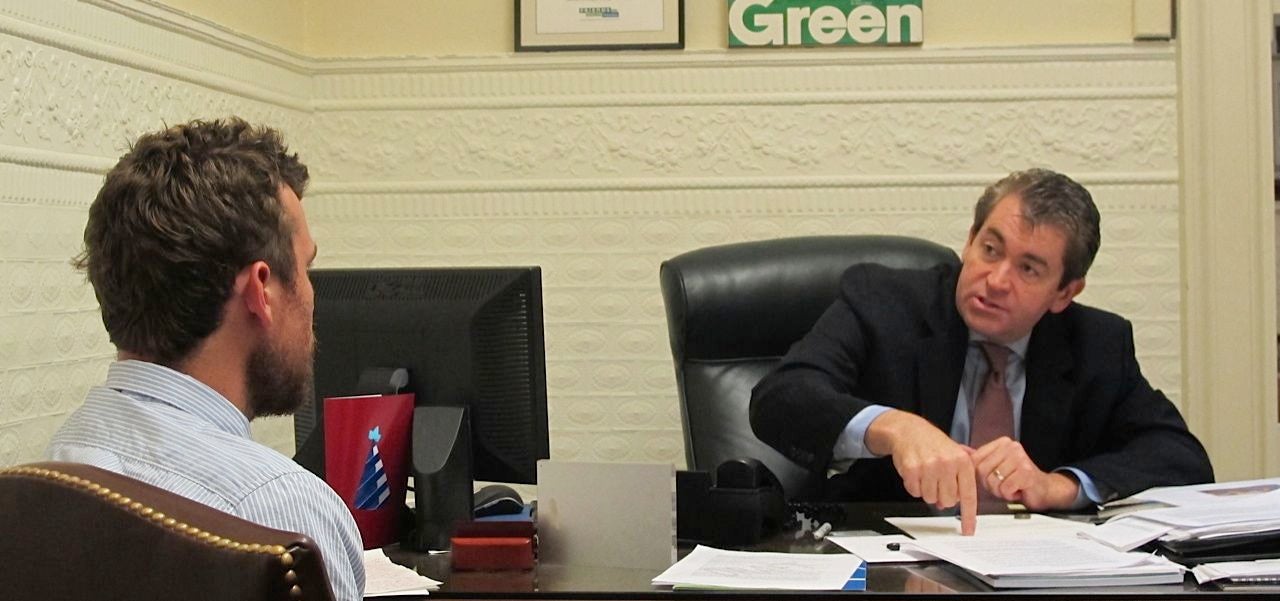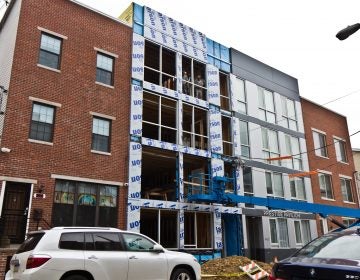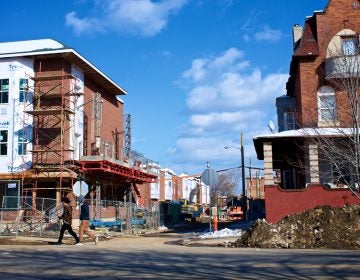Councilman Bill Green issues memo calling for amendments to the draft zoning code

In a memorandum issued to all City Council members Wednesday, at-large councilman Bill Green laid out ten recommendations for amending the Zoning Code Commission’s preliminary report prior to passage of the new zoning code. Green said that his recommendations represent a “middle ground” between the ZCC’s minority and majority reports released last spring.
Upon its release, the minority report, which Green supported, met with some resistance from other ZCC members. That report featured a phased implementation of the new code, which some felt would create a chaotic administration process, because the city would essentially be enforcing different zoning codes for different neighborhoods. In an exclusive interview with PlanPhilly Tuesday afternoon, Green explained what’s changed since the initial reports were submitted to Council.
“The big argument against the minority report, which came out of nine members of the Zoning Code Commission, was that it effectively created two codes,” Green said. “My point is when you allow all these overlays for organized neighborhoods … you’ve created two codes, and you’ve done it in a way that is unfair to neighborhoods that haven’t been as engaged. In fact it’s hypocritical.”
Green called out specific neighborhoods, saying in his memo that the Northern Liberties Neighborhood Association was able to get ZCC support for carrying over some overlay protections relating to drinking establishments from the current code into the new one. Green said that while he supports residents’ right to have a say on potentially noxious uses in their neighborhood, it isn’t fair that this right is only granted to neighborhoods which ‘speak up and have lawyers’.
Nonetheless, Green’s new proposals abandon phased implementation, and call for a nearly complete adoption of the majority report—with a number of amendments. The chief difference between the report Green supported last spring and the proposals he is supporting now is that, rather than staggering implementation of the new code based on the neighborhood remapping timeline, the new code will automatically take effect citywide with certain “potentially noxious uses” prohibited until after remapping has been completed.
Green wrote in his memo, “I believe that with the recommendations contained herein, zoning reform will drive development, signal that Philadelphia is ready to do business, create jobs and improve our economy while also protecting the interests of residents and preserving the unique character of diverse neighborhoods.” Council is set to open public hearings on the zoning proposals next week.
Green’s specific proposed changes are explained below.
“1. Eliminate methadone clinics from the Medical, Dental, Health Practitioner subcategory and separately regulate methadone clinics.”
Green said that while he had no data regarding the methadone clinics’ effect on property values or quality of life in their surrounding neighborhoods, his office regularly receives objections from community members when such clinics are proposed. His proposed changes call for methadone clinics to be subject to the Pennsylvania Municipal Planning Code which, as a rule, prohibits them within 500 feet of certain other uses, such as schools and daycares. “The kind of development that this code is trying to promote,” Green said, “is different than a plethora of methadone clinics popping up across the city.”
“2. Eliminate automatic expansion of nonconforming commercial and industrial uses and structures.”
In his memo, Green says that the eventual elimination of nonconformities is a “fundamental” principle of zoning reform. Under the ZCC’s preliminary report, nonconforming uses and structures are allowed to expand by 15 percent, partially in an attempt to reduce the number of variance cases before the Zoning Board of Adjustment. Green’s memo reads, “One of many unintended consequences of automatic conversion is that inappropriate uses and structures are permitted to grow larger without public input under the automatic expansion.” He supports a prohibition on nonconformity expansion until after public input on specific sites can be solicited through the remapping process.
“3. Restrict the primary use of Open Space and Recreational districts to recreation only, and permit multiple accessory uses as a matter of right when it is ancillary and incidental to recreation.”
Green said that this recommendation is part of an effort to protect Philadelphia’s parks and open spaces from commercial development. He said he wants City Council to have a say regarding any development that is proposed in areas regulated by the Parks and Recreation Department.
“4. Specifically map regulated uses in commercial and industrial districts where such uses are determined appropriate through district remapping.”
Under the proposed zoning code, regulated uses such as adult services, pool halls, and tattoo parlors are permitted by right in I-3 industrial districts. Green points out in his memo that I-3 districts make up just over eight percent of zoned land in Philadelphia. Some of these districts, Green said, butt up against residential districts. He wants the City to look more closely at these areas, and only permit regulated uses by right in industrial districts where it is truly appropriate.
“5. Prohibit or permit by special exception all proposed residential uses that are potentially harmful to some residential neighborhoods until such residential use is otherwise accepted by constituents who reside in the neighborhood through district remapping.”
Green feels that, given the variety of Philadelphia’s different neighborhoods, it doesn’t make sense to uniformly apply new residential uses to all residential districts in the city. He suggests that while a new use such as a Bed & Breakfast may be appropriate in a certain neighborhood, it may be harmful in another. This recommendation is intended to give residents an opportunity to decide whether they want such “potentially harmful” uses in their neighborhoods. The uses that Green says should be prohibited until after district remapping are as follows: Bed & Breakfast, Educational Facilities, Group Living, Library & Cultural Exhibits, Methadone Out-Patient Treatment, Religious Assembly, and Building or Tower-Mounted Wireless antennas. His proposal says that Active Recreation and Basic Utilities and Services should be permitted by special exception prior to district remapping.
This proposal also recommends that the “Home Occupation” use be broken into two subcategories: “Home Office” and “Home Business Operation.” The main distinction would be that, in the Home Office use, the “recipient of such business is served remotely,” while in the Home Business Operation use the service is provided on site. The former group includes, for example, freelance writers and web designers; the latter includes doctors and dentists, among others. Under Green’s proposal, Home Offices would be permitted by right, while Home Business Operations would be prohibited or permitted by special exception prior to remapping.
“6. Prohibit or permit by special exception all proposed commercial uses that are potentially harmful in some neighborhood commercial corridors and residential mixed-use districts until such uses are otherwise accepted through district remapping by constituents who will experience the impacts of permitting such uses.”
The sixth recommendation more or less mirrors the fifth, but with a focus on commercial rather than residential uses. Green’s memo suggests that the removal of many special overlays which exist under the current code may threaten the character of some commercial corridors. He uses Germantown, where residents have been lobbying to keep the prohibition against variety stores which is part of their current overlay. Green’s memo reads, “While variety dollar stores are innocuous, the proliferation of them would diminish the character of most neighborhood commercial corridors.” He proposes that, prior to remapping, Assembly and Entertainment uses, Nightclubs and Private Clubs, and Visitor Accommodations be prohibited in residential mixed-use districts. He also wants Sit-Down and Take-Out Restaurants and dollar stores to be permitted only by special exception until after the remapping is complete.
“7. Eliminate the unreasonable burden placed upon protestant neighborhood groups and non-applicant property owners for Special Exceptions by incorporating the burdens of proof determined by Bray v. Zoning Board of Adjustment, 410 A. 2d 909 (Pa. Commw. 1980).”
Green said that he feels that the Special Exception procedures laid out in the draft code unfairly burden community groups over developers. His memo reads, “The burden of proof for specific criteria such as traffic congestion, fire and safety, overcrowding, etc. is placed upon opposing parties for the applicant to rebut. This creates an unreasonable and undue burden on neighborhood groups and adjoining property owners that only well-trained and sophisticated groups can accomplish.” Green said it is overly burdensome for communities to have to pay for and produce, for example, traffic studies regarding a developer’s proposal. “We believe the new rules with respect to special exceptions shifted the burden to the people opposing the special exception use,” he said. It should be noted that the burdens determined by the Bray decision are themselves considered relatively heavy for protestants.
“8. Eliminate mandatory submission requirements and penalties related to private Community Benefits Agreements.”
“I don’t know why we want to get into the business of disputes between communities and developers,” Green said. The proposed code requires that any Community Benefits Agreements (CBAs) formed between an applicant seeking a variance and a neighborhood be submitted to the ZBA prior to a hearing. If the ZBA grants a variance, and later finds that the applicant failed to file an existing CBA to the board, the granted relief must be vacated. Green describes this new provision as a matter of potential liability for the City, and wants it removed.
“9. Permit Registered Community Organizations (RCOs) to set geographical boundaries that match its organization formation documents. For geographical areas not represented by an RCO, refer developer applicants to the district councilperson, who will exercise the rights of the RCO or assemble unregistered community members to take action on the proposed project.”
The draft code requires that RCOs be notified and engaged when an applicant seeks a special exception or variance, or when Civic Design Review is triggered. Green said that he wants RCOs’ geographical spheres of influence to be officially defined in order to avoid inappropriate overreach or conflicts between different groups. He also wants projects proposed in parts of the city that are outside the influence of any RCOs to be referred to the council members whose districts those proposals are in.
“10. Allocate resources that will enable the Planning Commission to complete district remapping in two years or less.”
The Planning Commission is currently working under a five-year timeline for district remapping. Councilman Green wants to allocate additional resources to that Commission in hopes of speeding up that process. He sees this recommendation as a way to limit the amount of inappropriate development that may arise in the time between the passage of the new code and completion of remapping. As he says in his memo, “I have recommended publicly that the city use one million of the $7.5 million municipal-bond bid-rigging settlement windfall to expedite citywide district remapping. If remapping occurs early, constituents will have meaningful input about how their neighborhoods are zoned before any inappropriate development is established and vested.” He pointed out that Council cannot dictate the administration of the Planning Commission, but it can offer them more money in hopes that they will hire more staff and complete the remapping process more quickly than is currently planned.
In all, it seems that Green’s proposals are unlikely to cause any major disagreements among zoning reform advocates. Moreover, if they have the intended effect of drumming up support among Council, these changes may help get a new zoning code approved more quickly.
“I want to accomplish this by getting something passed in City Council,” Green said. “It seems to me that what I’ve proposed is a middle ground, far closer to the majority report than the minority report, that I’m hopeful people can get behind.”
Next Up: PlanPhilly solicits reactions to Councilman Green’s proposed changes to the draft zoning code.
Key dates
Thursday, Sept. 8: City Council will be briefed by ZCC officials about the process, community engagement, drafts and revisions made to the final document after the comment period. This event is open to the public (Thursday, 9/8 @ 1 p.m.). City Council, Caucus Room, City Hall
Wednesday, Sept. 14: City Council will hear testimony from many individuals and organizations involved in the effort to reform and modernize Philadelphia’s outdated and complex zoning code. This is the first overhaul of the City’s zoning code in 50 years (Wednesday, 9/14 @ 10 a.m.). Public hearing, City Hall, Room 400
Contact the reporter at jaredbrey@gmail.com. Nick Gilewicz contributed to this report.
WHYY is your source for fact-based, in-depth journalism and information. As a nonprofit organization, we rely on financial support from readers like you. Please give today.






